Welcome to this advanced-level blog post about Google Author Rank. As an authority with a thorough knowledge of authoring algorithms, I’m here to provide insight into how Google evaluates authors according to their reputation and expertise.
This post will teach you about the main Google Authorship algorithm designs and how high author ranking can impact search results. We’ll describe Google’s author recognition methods, including using “author vectors” to generate word scores contributing to ranking scores.
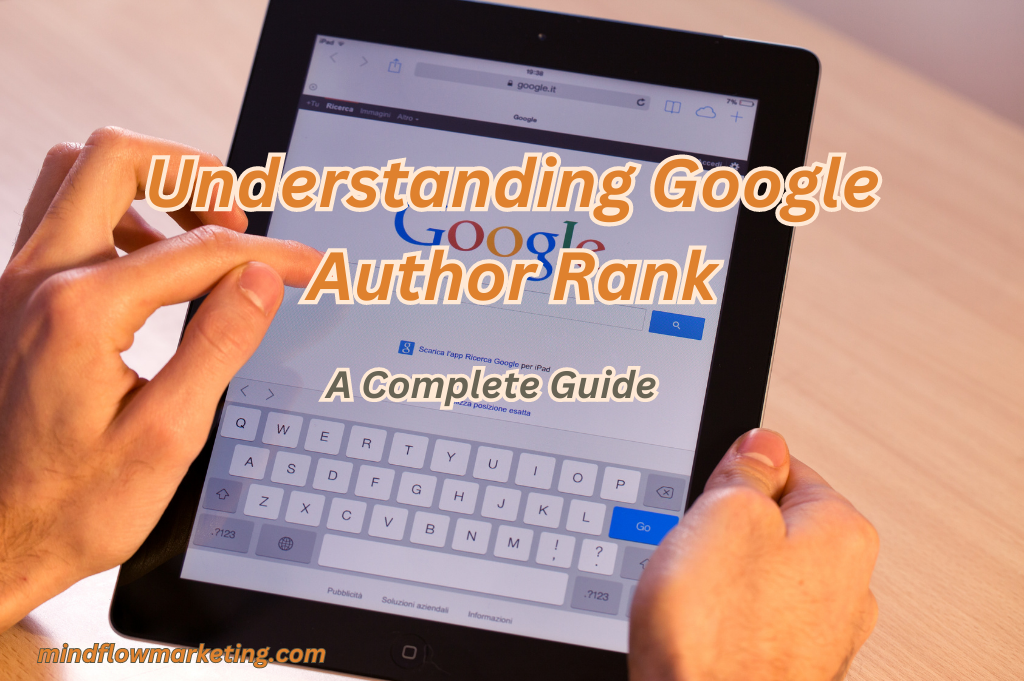
What is Google Author Rank?
Google Author Rank is a term to describe Google’s understanding of the authorship of documents. It is used for ranking web pages based on the reputation and expertise of an author, as opposed to PageRank or Information Retrieval Score. Author Rank can help optimize search engine results and improve user satisfaction.
For better or worse, you’re building your reputation when your content is linked through Google’s Authorship markup (see Brian Jensen’s post on that topic here).
How Does Google Author Rank Work?
Google Author Rank tracks information about authors, such as their online presence, content quality, and social media engagement. This data is then used to calculate an “author rank” score which is then applied to each document that the author has written or contributed to determining its position in search engine results pages (SERPs).
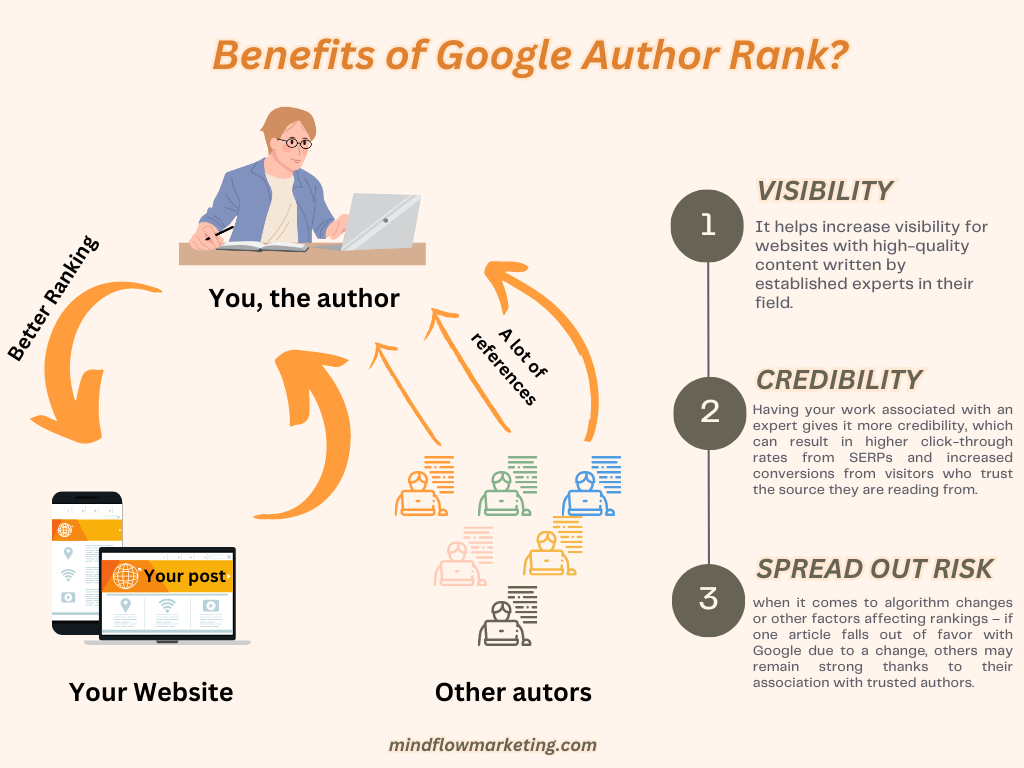
What are Some Benefits of Google Author Rank?
What is Google Agent ? Is it the Same as Google Author Rank ?
What is Google Agent?
Google Agent is an algorithm that allows Google to determine who wrote what content on the internet. This means it can differentiate between authors even if they have similar writing styles or use multiple accounts or pseudonyms online.
The patent also states that it will consider other factors, such as how long something was written, where it was published, etc., when determining who wrote what content.
How Does It Work?
The algorithm analyzes certain features of each piece of content, including grammar patterns, syntax structure, and word choice, to create a unique profile for each author based on their writing style.
Then when someone searches for content related to a particular topic or keyword phrase, this profile helps Google decide which pieces of content are most likely written by that author and rank them higher in search results (known as “Author Rank”).
What Is The Difference Between Google Agent And Author Rank?
Although both concepts are related to authorship recognition from various sources across the web, there is one major difference between them.
Author Rank focuses more on quality than quantity (i.e., ranking pages higher if they contain high-quality information).
Google Agent looks at both aspects equally, considering how well-written something is and how often an author has been credited with producing quality work over time before giving them any rankings boost in search results pages (SERPs).
What Are Author Tags?
What Are Author Tags?
Author tags are brief phrases that identify the source of a particular piece of information or idea. They usually include the author’s name and any additional relevant details, such as their title or position on the subject matter.
Why Use Author Tags?
Using author tags helps writers avoid plagiarism by clarifying which parts of their work have been taken from another source and which have been written by them. It also allows readers to better evaluate your argument by providing context for each statement in your paper – allowing them to understand why you chose certain sources over others when researching your topic.
How To Write Effective Author Tags?
When using author tags, it is important to ensure they are accurate and consistent throughout your paper. Make sure you use correct spelling for names and titles; if there is more than one person associated with a single quote or statement, all names should be included; if multiple quotes from one person appear consecutively, only include their name once at the beginning; lastly, be sure not to mix up different styles (e.g., APA vs. MLA).
Do Google Rank Authors Base on Their Expertise?
Yes, Google does rank authors based on their expertise. The search engine considers the author’s true expertise and the prominence of their article when assigning PageRank to a website. By following links from various author profiles, Google can learn more about the main content creators for a website. Structured data from an author’s profile can help them be recognized faster by the search engine and improve their confidence score in understanding that particular person’s topic.
Authors are grouped not only by their level of expertise but also by topic area. Sources with multiple authors on the same subject matter can designate primary authors for their website who will have higher visibility within searches related to that field.
Google considers many other factors when ranking authors, such as how often they post new content, quality of writing, relevance to current topics or trends, citations or backlinks to authoritative sources, and engagement levels with readers through comments or social media shares.
Authors must keep up-to-date with SEO best practices to get maximum exposure within SERPs (Search Engine Results Pages). This includes using relevant keywords throughout the text without overstuffing them, as well as optimizing titles, meta descriptions, and URLs appropriately, so they appear in results organically rather than via paid advertising campaigns like PPC (Pay Per Click).
Finally, it is important for an author’s credibility that all content posted is original work; otherwise, any rankings gained could quickly be lost due to plagiarism penalties imposed by Google algorithms if duplicate material is found online elsewhere. So if you want your name at the top of those SERPs, you better put your best foot forward.
How Does Google Recognize Author-Named Entities?
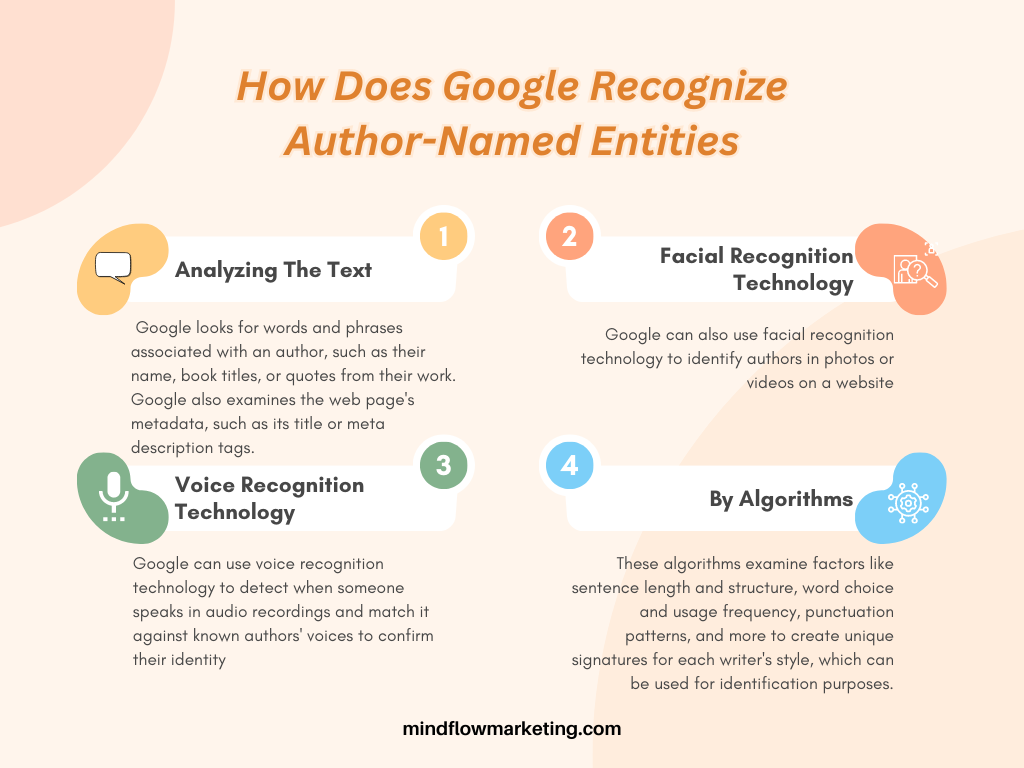
Google uses a variety of methods to recognize author-named entities.
The first is by analyzing the text itself. Google looks for words and phrases associated with an author, such as their name, book titles, or quotes from their work. Google also examines the web page’s metadata, such as its title or meta description tags.
Google can also use facial recognition technology to identify authors in photos or videos on a website. This helps them determine if an article was written by a particular person, even if they don’t have any other identifying information about them.
Google can use voice recognition technology to detect when someone speaks in audio recordings and match it against known authors’ voices to confirm their identity.
Google has developed algorithms that analyze writing style to generate “author vectors, ” allowing them to accurately identify authors across the internet even when they are not explicitly mentioned on the page.
These algorithms examine factors like sentence length and structure, word choice and usage frequency, punctuation patterns, and more to create unique signatures for each writer’s style, which can be used for identification purposes.
Once the right authors have been identified, setting up individual bio pages on one’s website is essential to give visitors a better understanding of their qualifications and background.
It is also beneficial to spread the word about these writers’ work through social media platforms such as Twitter, Facebook, and Instagram, ultimately increasing traffic to both websites while further deepening engagement between all parties involved.
What Are The Patents For Author Recognition?
Google filed a patent for Generating Author Vectors in March 2020. It enables them to identify authors on the internet solely based on their writing style, even if their names are not explicitly mentioned on the page.
Author Vectors: By Slawski, Google Knows Who Wrote Which Articles, explains that Google’s new patent uses a neural network system trained on a set of words to identify an author even when the text is not labeled as having been written by that author.
Google patents algorithms for recognizing and defining authors while collecting information about their work. Google Authorship algorithms can be found on various search engine result pages and features, including knowledge panels, Google Books, Scholar, and News.
Why Should Enterprises Care About Authorship?
The most important takeaway for enterprise SEO is that the more important the content, the more emphasis you should place on its trustworthiness, which means enlisting the help of qualified experts in its creation.
However, including authors in bylines and linking those bylines to dedicated author pages shows that you care about providing your visitors with trustworthy content.
With the growing interest in generative AI, we are on the verge of a content explosion, as we have never seen before. As a result, anything you can do to make your content stand out from the crowd is critical.
Of course, authorship is a minor step after you’ve created your authoritative content.
Your first step should be to create authoritative content! This is where an AI content optimizer can help. One example is Content Fusion, which allows you to understand and write authoritatively about a topic at scale.
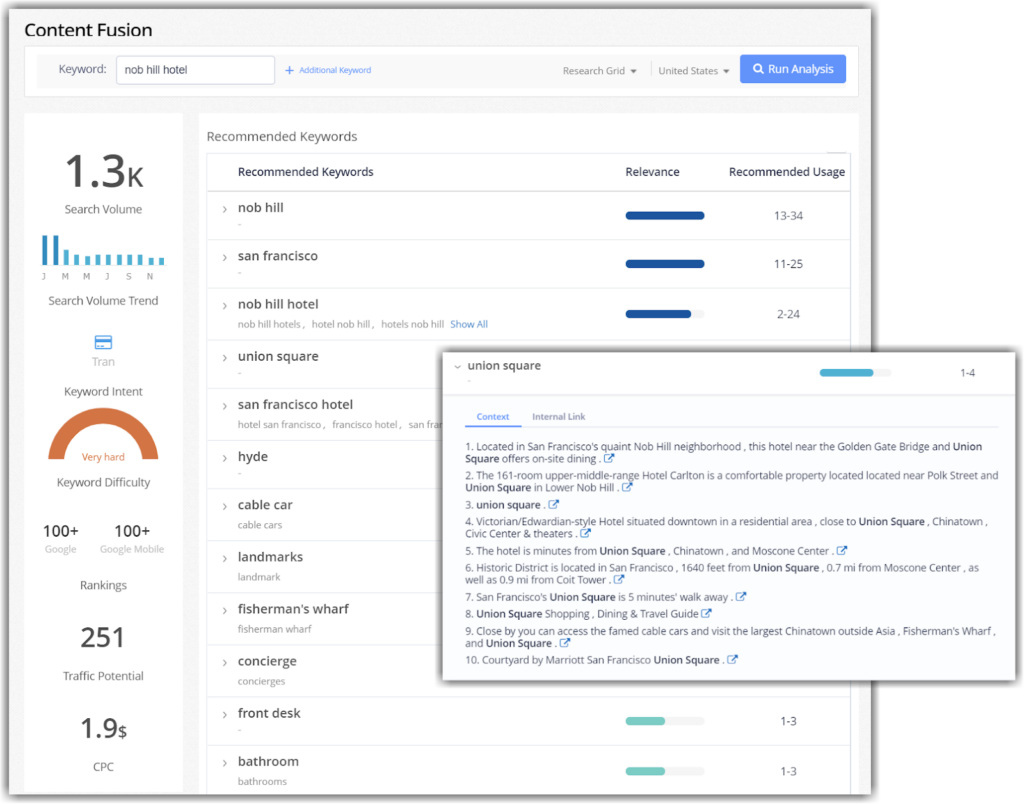
Google Author Knowledge Panels
Google has been showing more authors with a Knowledge Panel and featuring their published content when you search for their names in recent years.
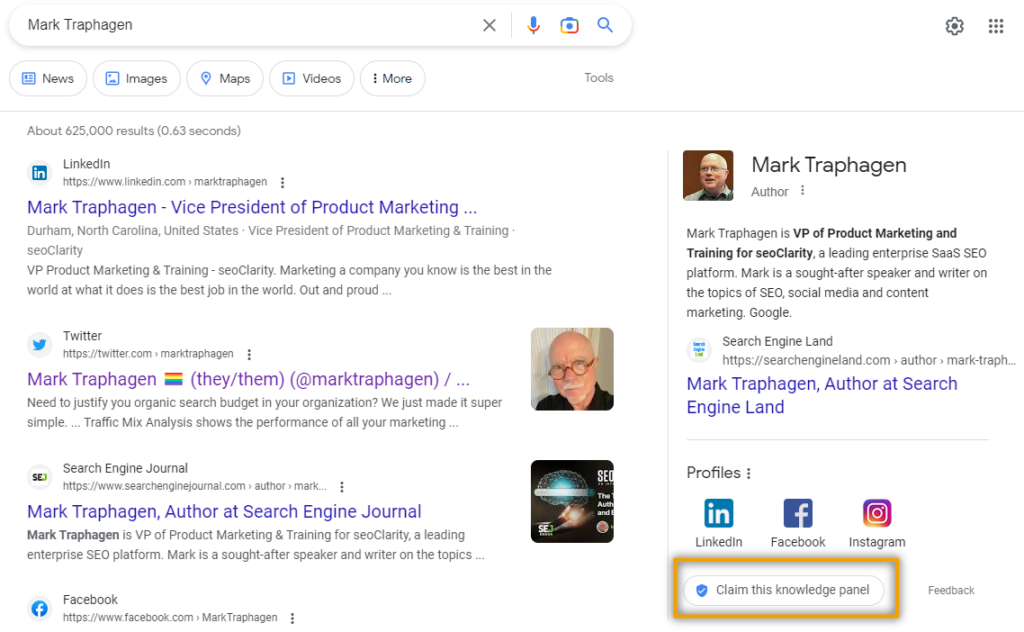
How to Claim an Author Knowledge Panel?
Most, if not all, content management systems allow you to specify an author.
Once you’ve taken the time to create authoritative content, show your audience which the author is.
If you discover a knowledge panel for your name or the names of people you work with, here’s how to claim the listing and verify authorship.
If Google accepts your validation, the button will disappear after a few days, and the search results for your name will become even more focused on your published content.
How to Use Author Rank in SEO?
Using author rank can boost your website’s visibility in organic search results and increase its credibility among potential customers or readers searching for specific topics related to what you write about or offer on your site.
Additionally, having high-quality authors associated with your website will make it easier for people to find you through social media platforms like Twitter and LinkedIn, where they can connect with them directly.
The first step towards building up an effective author rank strategy is finding quality authors who specialize in writing about topics that are relevant to what you offer on your website or blog posts.
Once these writers have been identified, create individual bio pages on your site dedicated specifically for each one so that visitors can learn more about their background and qualifications before deciding if they want them to contribute articles regularly or not.
Promote their work across social media channels, including Twitter, Facebook, Instagram, etc., to build awareness around their expertise, eventually leading back traffic towards both your and their websites and increasing overall engagement levels between parties involved.
But Why is Author Rank Important?
Having a strong author rank means having more visibility for your website since search engines are more likely to feature your content prominently if it comes from someone deemed trustworthy by Google algorithms – this could lead to increased traffic and engagement levels over time.
Additionally, building good relationships with other experts in your industry can help build credibility and trustworthiness among potential customers and clients – both of which are essential to successful digital marketing strategies today.
Conclusion
Google Author Rank is an important tool for SEO, as it helps to identify authors and their expertise. It can boost a website’s rankings by recognizing author-named entities and using patents related to author recognition.
Google Agent also plays a role in tracking authors and ranking them based on their expertise. By utilizing these tools effectively, businesses can improve their search engine optimization efforts with greater success.